This polar survival management sim is based on real historical horrors
The Pale Beyond is inspired by true stories as awful and strange as any fiction.

In 2018 a show called The Terror, based on Dan Simmons' novel, told a fictionalized version of the Franklin expedition's doomed search for the northwest passage. Two ships were lost—one of which really was called HMS Terror, surely tempting fate—and their crews never found. The Terror took this true story of a struggle for survival in awful conditions and spiced it with supernatural horror. While I didn't mind the addition of a mystical murder bear, a lot of viewers liked the true-to-history parts so much they said they'd have preferred it without fictional horrors—just the real awfulness of cold, starvation, and lead poisoning from a bad batch of tinned rations.

Early on in development, the developers at Bellular Studios considered adding supernatural horror to their management sim about a polar expedition gone wrong. They decided against it because, as creative director Thomas Hislop explains, "The real world ice and the real world problems of the setting were often naturalistically weirder than any plucked-from-imagination game stuff we were considering maybe putting in. We kept coming back to like, 'Nope, real history is weirder, we should just follow through on that.'"
The Pale Beyond asks you to ensure the survival of a ship full of people (and sled dogs) who are trapped in ice and eventually forced onto it. "Frostpunk on a boat" would be the glib way of putting it, but there are also elements of games like The Banner Saga, Sunless Sea, and Dead in Vinland to the way it challenges you to make hard choices and balance resources in difficult circumstances. The Pale Beyond's memorable tagline is: "Every decision matters and the ice doesn't care."
Ice floe, nowhere to go
The history of polar expeditions led by the likes of Ernest Shackleton, Robert Scott, and Sir John Franklin taught The Pale Beyond's developers a lot of unusual and often grotesque things. Hislop mentions that frostbite was nasty stuff to read about, and sums up snowblindness as "sunburn on your eyeballs" while explaining that Shackleton's expedition brought cocaine eye drops to treat it. "There's a really great book called The Lost Men," he says, "it's like the forgotten second half of the Shackleton expedition that was sent around to the other side of the continent to try and lay depots for it. I think it was someone on that expedition who tried to use ethanol to cure some pain and they shattered all of their teeth because of the subzero temperatures. The temperature just affects everything."

"It is brutal," adds managing director Michael Bell. "I suppose our job is to transport somebody into that very hard position. If the game mechanics do their job they will have a hard decision, and they will also understand why it's rough. History always forgets the animals. I was reading some stuff on Napoleon's invasion of Russia and they'll just casually mention, 'Oh, you know, it got really cold and 30,000 horses were butchered.'"
In The Pale Beyond, sled dogs become vital to your survival once the ship's trapped and you're forced to send hunting and scouting parties out onto the ice. The kennel master, Cordell, acts as a voice for the dogs, telling you they're adapted to the ice ("It cools them through their paws as they run. They'd overheat otherwise,") while making sure you consider their lives valuable.
"Every decision has a face," Hislop says, "so we wanted to make sure you weren't making any decision that was affecting life or death without having to literally look the person in the eye, or have an actual person associated with the ramifications of the choice."
Keep up to date with the most important stories and the best deals, as picked by the PC Gamer team.
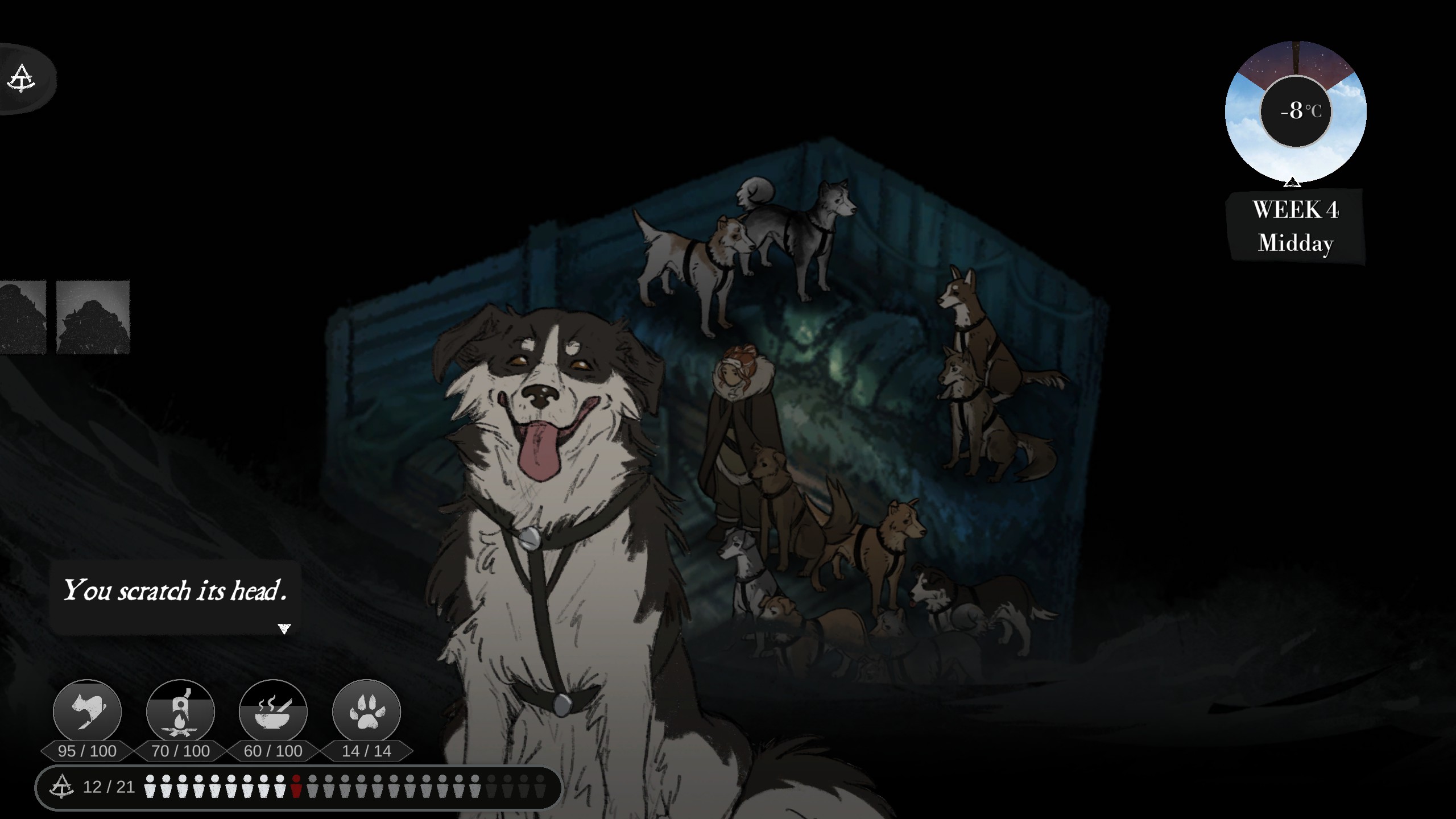
Bell compares these choices to "not sending the wrong character to fix the heat vent at the end of Mass Effect 2," suggesting not just that we'll be sad about mistakes because they'll cost us characters we cared about, but also the possibility we might make all the right choices and get everyone through this frozen nightmare. "I suppose you could say we were hitting Shackleton more than Franklin in terms of the player fantasy," he says. "Not that we're proscriptive: 'You're just going to be like Shackleton!' But the fantasy of being thrust into that crazy situation."
"If you save everyone," Hislop adds, "that's the achievement I put in yesterday: An Ernest Attempt."
While knowing a little about Ernest Shackleton or the doomed saga of the ships Erebus and Terror might add to your enjoyment of The Pale Beyond, it's a game informed by history rather than entirely true to it. The setting and time period are deliberately vague. Hislop calls it a "historically adjacent fantasy setting," which has advantages over the real world because "it just removes all the other clutter, all the other set dressing, and then it's all about these intrinsic, laid bare social dynamics."
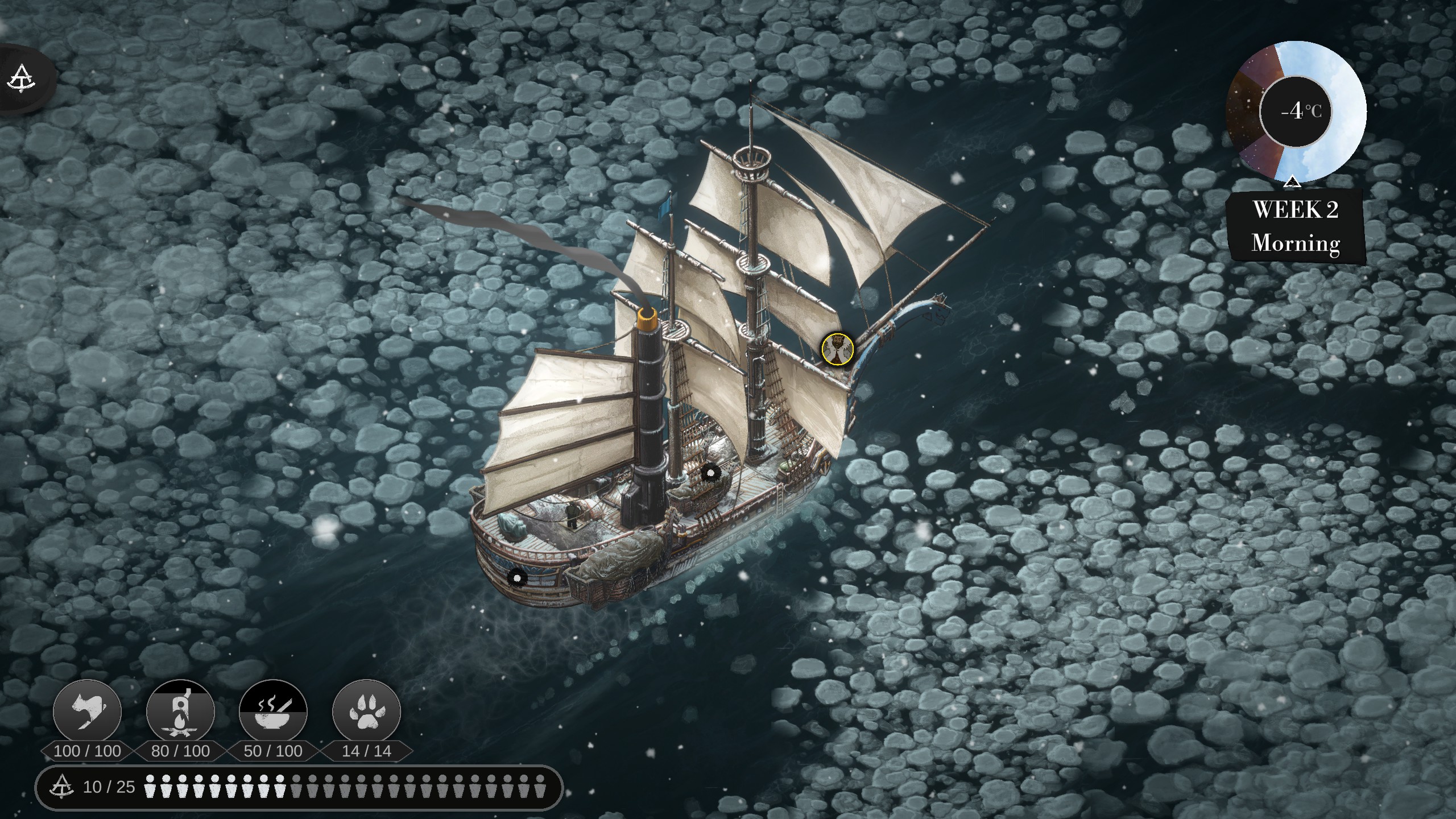
It also let them freely draw inspiration from expeditions across different time periods, like Roald Amunsden's South Pole expedition, Peter Freuchen's Thule expeditions, and relatively recent voyages in the 1940s and 1950s. That was freeing, Hislop says, "especially when we're trying to create a narrative possibility space of, 'Top-tier Shackleton run any%' versus 'Dying halfway through and doing a Scott'."
Alfred Lansing's book Endurance: Shackleton's Incredible Voyage was an important resource, with Bell saying, "I remember the audiobook as if it had sound effects, and the most surprising thing listening back to it is that there weren't any. The words were just so descriptive and profoundly immersive."
You can't do your normal filler of like, 'Oh, we'll have birds chirping and trees swaying.'
Thomas Hislop
The book has passages describing the pressure building on the Endurance's hull as ice slowly crushed it, with comparisons as far apart as the sound of a woman faintly crying in the distance and a roaring train coming at you. Those descriptions were given to audio director James Bruce, aka Trees. "You come into the office and he'd just be banging things together and scraping things and trying to create these really strange sort of pressured ice noises," Hislop says. "I think we've got all of the animal sounds for the penguins and seals, they're real recordings from the BBC Sound Archive from expeditions that we found. Penguins sound like velociraptors, it's terrifying."
Audio was important because when you're in a featureless environment there's not a lot to look at. The regular standby sounds of game audio weren't useful either. "Especially when you're doing Foley, there are very little natural sounds you can fall back on," Hislop says. "You can't do your normal filler of like, 'Oh, we'll have birds chirping and trees swaying.' It's, 'Uh, James, can you make wind sound interesting for 10 hours? And not repetitive?'"
Lost in the blinding whiteness of the tundra
The more they researched, the more they saw the same story repeat across these voyages, one in which people from different countries and social classes are "all going on this journey, literally to the end of the world and having this shared trauma and coming out of it the other end with more in common than with literally anyone else on the planet."
"Each expedition would almost develop its own culture," Bell says. In The Pale Beyond, those dynamics play out in conflict between members of the crew, some landlubbers while others are "saltborn", which can be overcome in the name of facing adversity together.
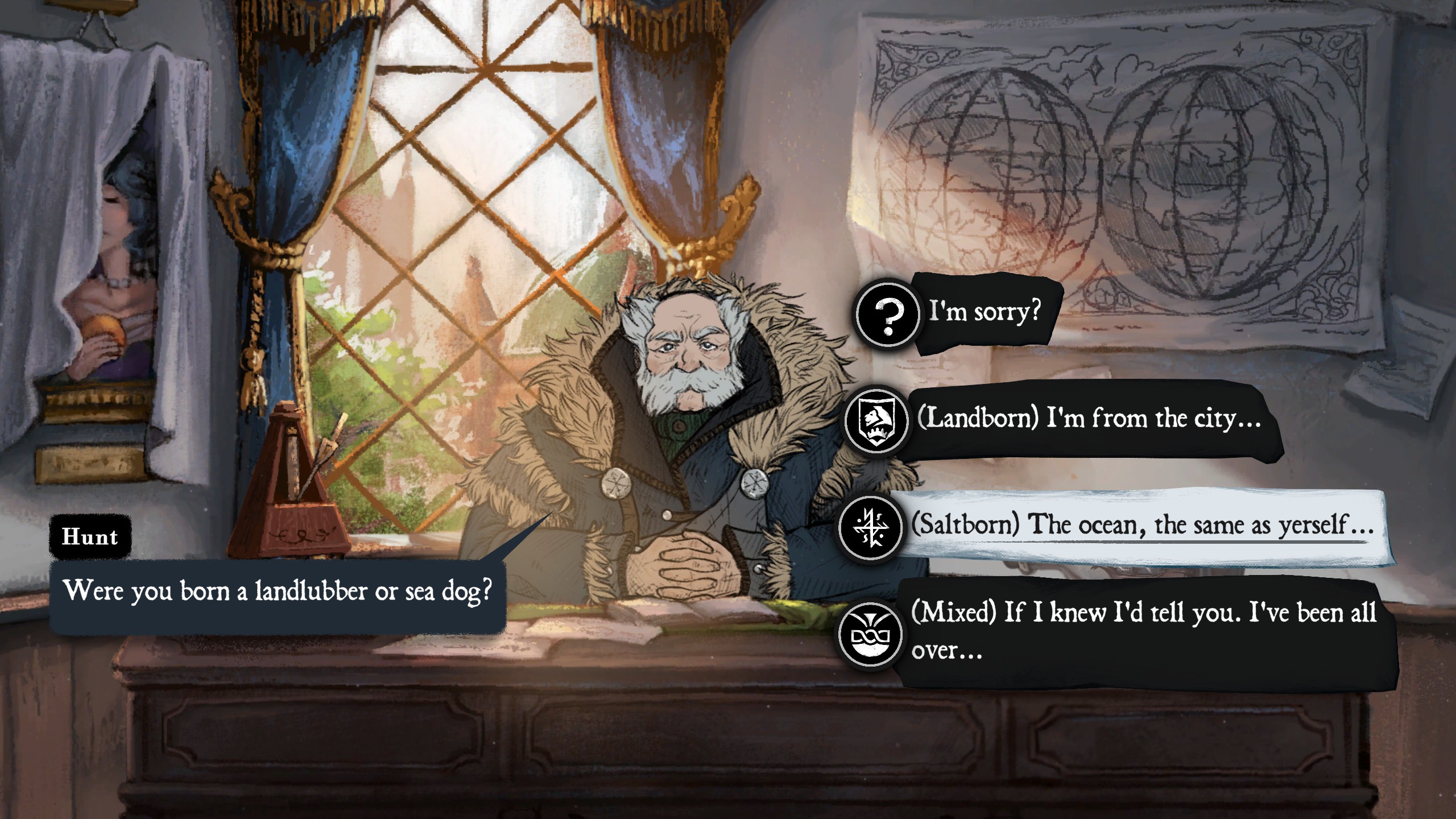
"We try to be true to the sense that none of the cast were inherently villains or heroes," Hislop says, "they're all just people." The Pale Beyond is a game about leadership and the effect it has on a group, he explains, where "people can become the villains of your playthrough or become the heroes of your playthrough, but it's not about the path they're initially destined to be on. It's about the unfurling machinery of the collective group."
It's a different sort of heroism
Michael Bell
Those social dynamics are simulated by a resource that can prove as important as the food stockpiles that prevent starvation and scurvy or the fuel that keeps the boiler running and prevents frostbite. This third resource has the evocative name "decorum".
"Decorum was an interesting resource," Hislop says, "because initially, obviously, it was just like a morale resource. But researching the ice, it's very subtle reframing, but it became a measure not of how happy people are, but how socially bonded in terms of that fake contract that's stopping you from eating each other."
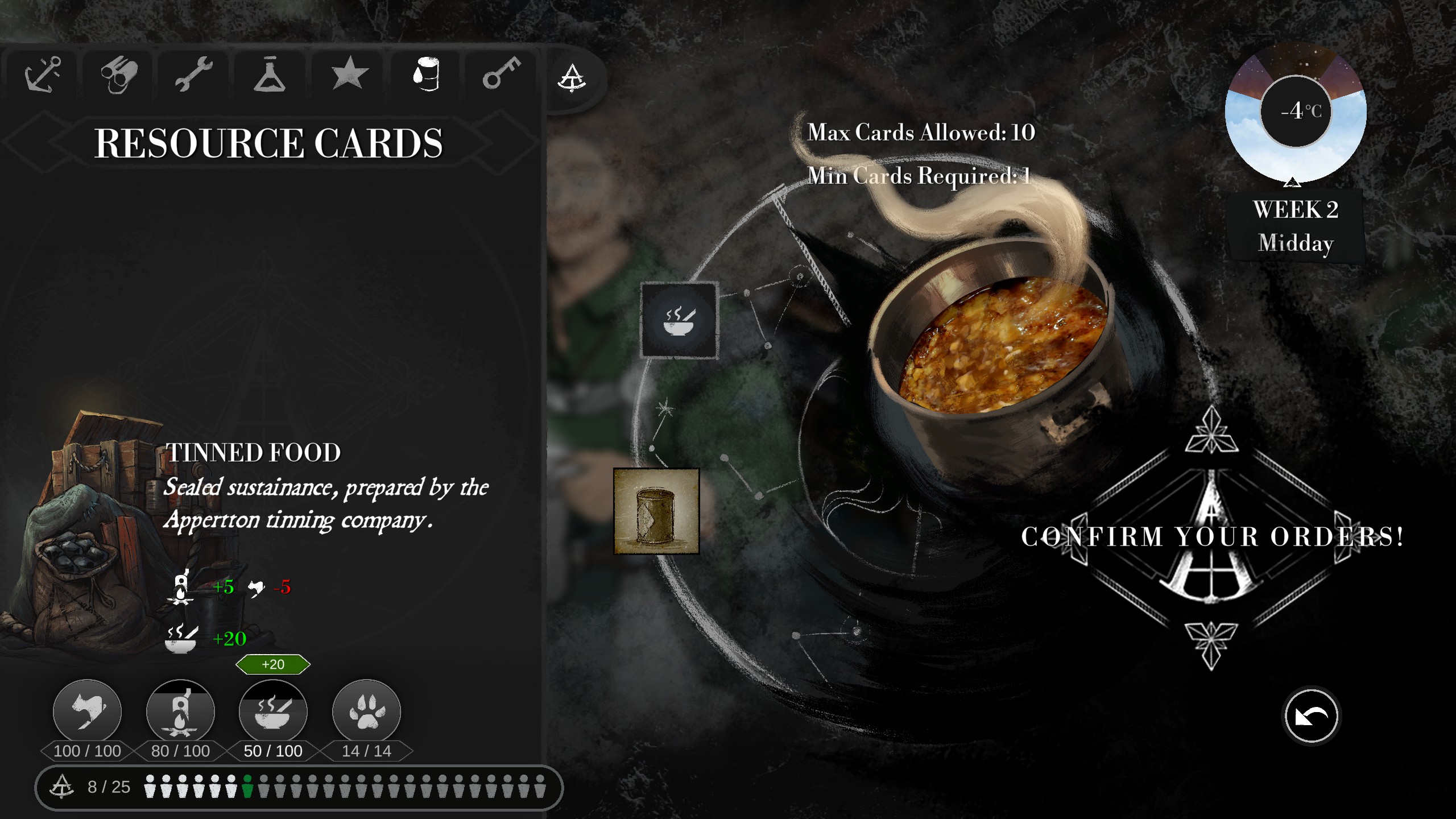
What keeps us fascinated by stories of polar expeditions is seeing how the extreme conditions push people to do extreme things, to reveal themselves when stretched to their limits. Whether they'll turn on each other to prolong their lives, or perform acts of self-sacrifice like Lawrence Oates—who, suffering from frostbite and gangrene, believed he was slowing down Scott's Antarctic expedition so much he stepped out of a tent saying, "I am just going outside and may be some time," then walked into the snow to die.
"It's the kind of thing where you can't really pull a fast one out of the situation that you're in because you truly are screwed," Hislop says. "There's no cavalry coming. Heroics are of limited value in a way, so I think it forces just a brutal focus on characters."
"It's a different sort of heroism," Bell says. "There's not an enemy."
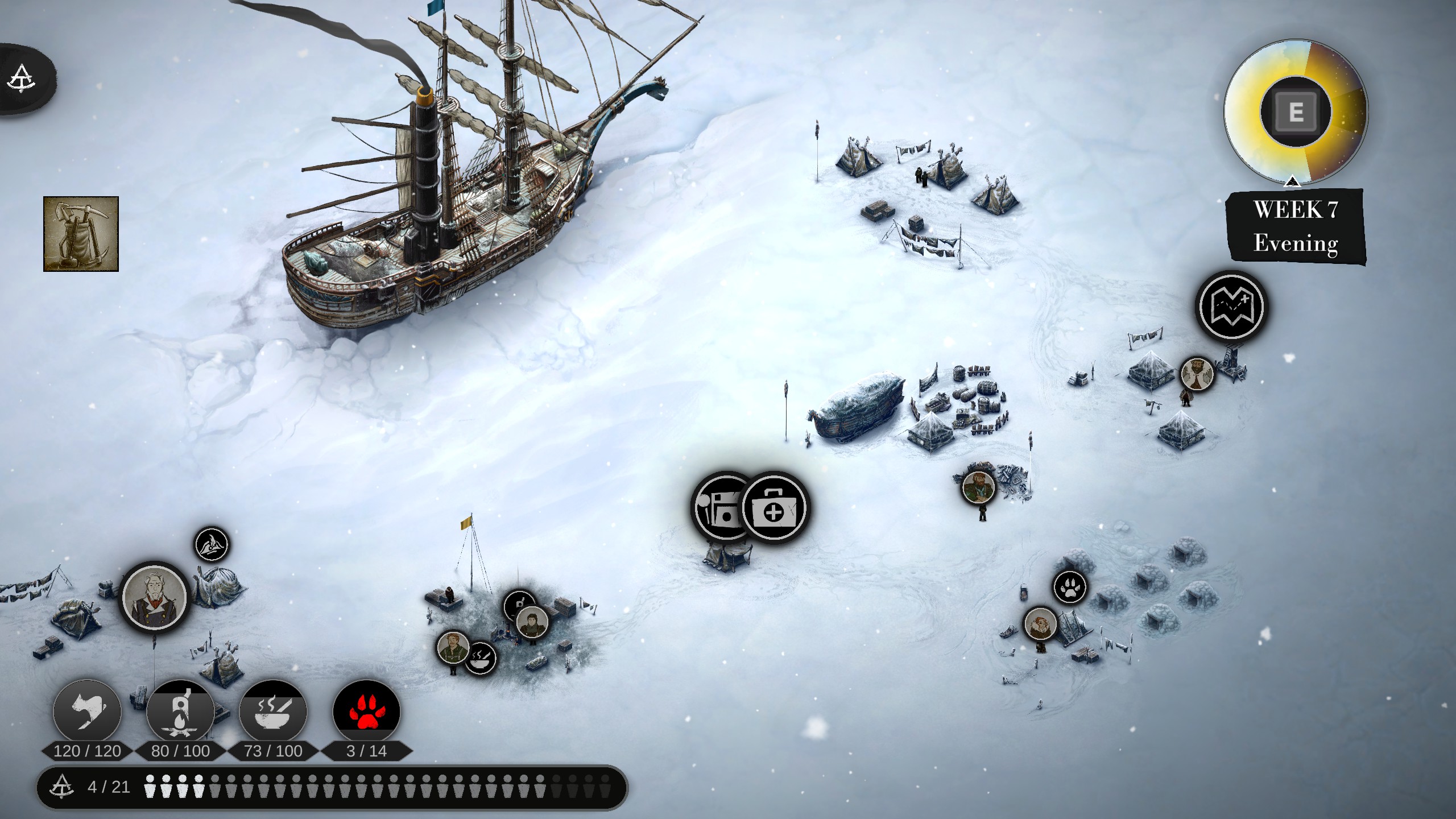
Those kinds of stories have timeless appeal, and find new ways to be relevant. As Hislop points out, "The irony isn't lost on us that a lot of these expeditions were effectively startup companies that were floated out into the ice to crash and burn spectacularly."
Barring disaster, ice-related or otherwise, The Pale Beyond will be available from Steam on February 24.

Jody's first computer was a Commodore 64, so he remembers having to use a code wheel to play Pool of Radiance. A former music journalist who interviewed everyone from Giorgio Moroder to Trent Reznor, Jody also co-hosted Australia's first radio show about videogames, Zed Games. He's written for Rock Paper Shotgun, The Big Issue, GamesRadar, Zam, Glixel, Five Out of Ten Magazine, and Playboy.com, whose cheques with the bunny logo made for fun conversations at the bank. Jody's first article for PC Gamer was about the audio of Alien Isolation, published in 2015, and since then he's written about why Silent Hill belongs on PC, why Recettear: An Item Shop's Tale is the best fantasy shopkeeper tycoon game, and how weird Lost Ark can get. Jody edited PC Gamer Indie from 2017 to 2018, and he eventually lived up to his promise to play every Warhammer videogame.

